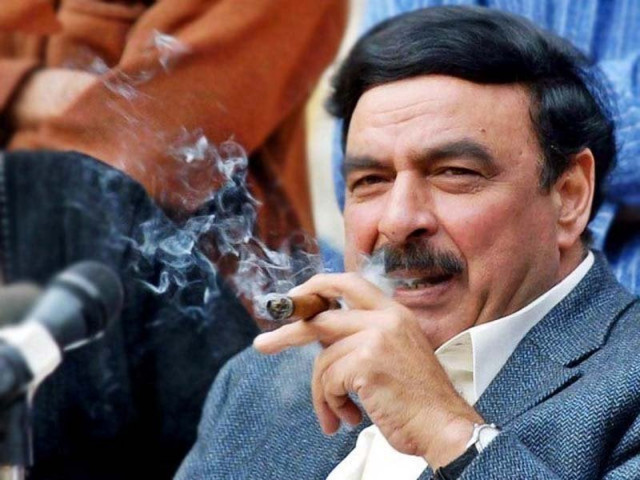SC judge wonders how a flats case led to disqualification for iqama
Raises the point while hearing petition seeking Sheikh Rasheed’s ouster for discrepancies in assets statement

Sheikh Rasheed makes scathing remarks against Shahbaz Sharif and other newly inducted candidates
PHOTO: EXPRESS/FILE
While hearing a petition calling for the disqualification of Awami Muslim League (AML) leader Sheikh Rasheed, the judge questioned whether the Panama Papers verdict would be applicable to any errors made by parliamentarians in the asset details submitted in their nomination papers, and whether they would be disqualified.
Justice Isa further asked whether the Panama Papers judgment would apply to all cases.
Justice Isa, who had already raised questions on the Panama verdict during the hearing of the Hudabiya case, pointed out that the principle of strict liability had not been set in the Panama case. Likewise, he added, the verdict did not discuss whether assets were concealed intentionally or mistakenly.
Panamagate saga ends: Prime Minister sent packing
The judge also observed if there was a problem, there was a need to examine the intention, adding that if someone was not getting any benefit from the error, then it could not be considered mala fide.
He said the Panama verdict says that anyone committing any error in their asset details was liable to be ousted. He also cited the example of US President Donald Trump, who is serving despite refusing to reveal his tax records. While in Pakistan, he said, there was disqualification on the basis of a simple error. Contesting the elections had become more difficult now, he added.
On the other hand, Justice Azmat Saeed Sheikh, who was a signatory of the Panama verdict, said if a parliamentarian concealed his asset, he would be disqualified. He said that there may also be considered that whether the error was done intentionally or intentionally.
Justice Isa, however, observed that same thing was not discussed in the Panama case. Upon this, Justice Sheikh said “every case has its facts” as no one had admitted error in the Panama case, but in the current case, an error had been admitted by Sheikh Rasheed. He said if the court dealt with Sheikh Rasheed’s error strictly, then he could not be ousted.
While speaking to Abdul Rasheed Awan, the counsel for Rasheed, Justice Isa said his client was a petitioner in the Panama case and now he was a respondent. He said someone pointing one figure at anybody would get four figures raised towards him.
Later, the three-judge bench, headed by Justice Azmat Saeed Sheikh, reserved its verdict on the disqualification plea filed by Pakistan Muslim League-Nawaz (PML-N) leader Shakil Awan against an Election Tribunal verdict dated February 18, 2015.
Panamagate: PTI plans to celebrate verdict
The petitioner submitted that Sheikh Rasheed had concealed his assets in his nomination papers filed for 2013 general elections. Concealment of assets can lead to disqualification.
During the hearing, Sheikh Ilyas, the counsel for Shakil Awan, stated that Sheikh Rasheed had a landholding of 1,083 kanals, but he mentioned only 983 kanals in his nomination papers. He added Sheikh Rasheed also owned a house in a private housing society valued at Rs40 million, but he declared its value to be Rs10 million.
Sheikh Rasheed’s counsel said there was no concealment of assets and it was only a calculation error.
During the hearing, when Shakil’s counsel mentioned the disqualification verdict against former premier Nawaz Sharif, Justice Sheikh remarked, “We were waiting for you to bring that up.”
The counsel contended that Sheikh Rasheed provided incorrect information regarding his landholding, agricultural income, and total income tax paid. He said the landholding related to Ramma in Fateh Jang tehsil of Attock district while details of agricultural landholding in Rawalpindi, while not disclosed, was also not deliberately concealed as this can be established from overwhelming oral as well as documentary evidence produced by Sheikh Rasheed.



















COMMENTS
Comments are moderated and generally will be posted if they are on-topic and not abusive.
For more information, please see our Comments FAQ